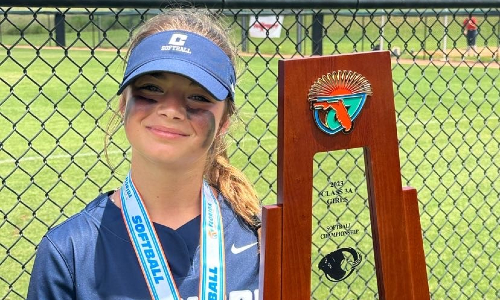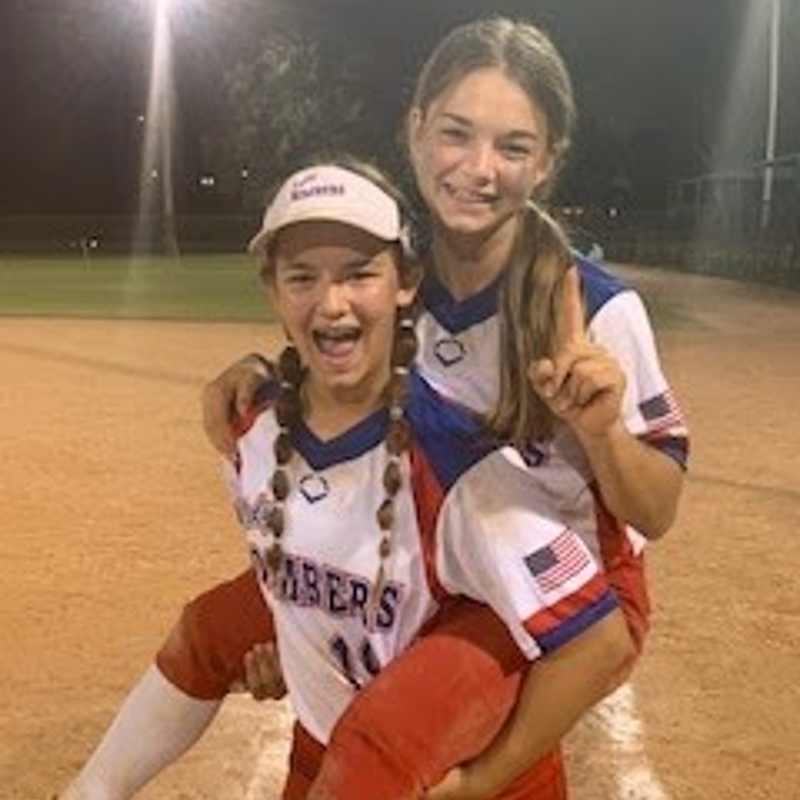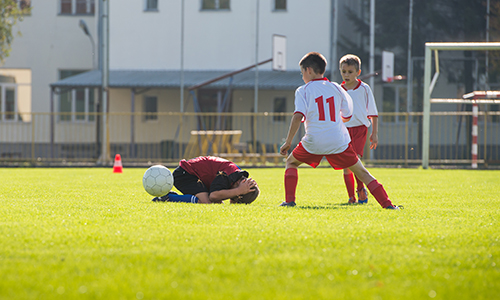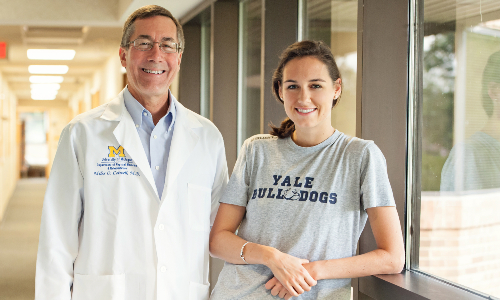Get Inspired
Being Your Own Advocate After Injury
Aspen Malasky is a talented high school athlete who excelled as a star catcher on her softball team. A concussion during a recent tournament left her with headaches and other symptoms, which she still experiences sporadically. On those days, Aspen makes sure to take care of herself and understand it is all part of the recovery process. Though she no longer plays the sport she loves, she is excited and ready for the next chapter of her life. Below, Aspen shares her Inspiring Story to raise awareness around concussions and the importance of being your own advocate after a brain injury.

By Aspen Malasky
Growing up, I was always an athlete. Sports were my passion, from gymnastics to skiing to soccer to ice skating. At age seven, I started softball and instantly fell in love with it. As I got older and better, I switched from Little League to travel ball, practicing, wanting to be the best I could be. I enjoyed playing any position, but nothing appealed to me like catching. I loved being involved in every play.
A few years ago, I was at a softball tournament just like any other weekend. I was behind the plate, and there was a runner on third base. On a ball hit to the infield, she ran for home, where I was ready to make the tag. The throw came to me, I caught it, but the runner ran straight into me, knocking me to the ground. Eventually, after getting back up, I felt like I was spinning, and my head hurt like crazy. My coach asked me if I was okay and if I could finish the game. I chose to ignore the fact my head hurt, so I said yes and played the rest of the game. After it finished, I still had a headache the whole way home. When my headache and other symptoms did not go away, my parents figured I had a mild concussion. I took a few weeks off, and once I felt better, I went back to playing as usual.
About a year later, my teammates and I had a team bonding party. There was a small dunk tank, and I was sitting on the chair waiting for my sister to fill the bucket above me. I was too stubborn to move, and she ended up accidentally dropping the entire bucket full of ice and water on my head. Just like before, I had constant headaches that would not go away. My parents took me to the doctor, where I was diagnosed with another concussion. Once again, I took time off from softball until my symptoms were gone, then continued playing.
A few months later, I was at another softball tournament catching as usual. There was a runner on second base, and the batter hit a line drive to left-center. The runner was at third by the time our outfielder (my younger sister Brecka) got the ball, so she sprinted for home. The throw arrived like a bullet into my glove. I was ready for the tag, making sure I was out of the baseline. But the runner did the worst possible thing she could have done: instead of sliding, she ran straight into me, elbowing my face and knocking me down. Topping it all off, I took off my helmet right before we collided so I could see the ball better. My head slammed the ground, which left me lying there crying hysterically, unaware of what had just happened. The girl was immediately ejected from the game for not sliding and elbowing me in the face. I went to the dugout unable to lift my head up and eventually vomiting. I did not want to leave the game even if I couldn’t watch, because I wanted to be there for my team.
My dad took me to the ER to make sure there was no brain bleed or other issues. While doctors found no signs of a brain bleed, they did tell me I had a concussion. For weeks, I constantly had awful headaches and felt terrible all day. Eventually, my symptoms improved and I again went back to playing.

In January of 2023, I made my high school softball team as a freshman. I was super excited, knowing I would learn a lot from the coaches and older players. After our second game of the season, I was at practice catching routine fly balls in the outfield. I went for the first fly ball but lost it in the sun. Instead of catching it, it hit me directly above my eye. I took a little while to sit down and ice my head, waiting for the athletic trainer to come and clear me to return to practice. He told me my eyes and balance seemed a little off, so we called my mom to pick me up from practice. I once again developed nonstop headaches along with sensitivity to light and noise. The doctor told me I had suffered another concussion. However, my symptoms did not go away. Only after about a month did things get a little bit better. I went back to school and was able to resume classes.
The week I was supposed to get cleared to rejoin softball, I was in gym class doing homework on the side (since I couldn’t take part in activities just yet) when a volleyball hit my head. It took me a minute to realize what had just happened. Fortunately, my friend who saw everything had the good sense to take me to the nurse. The school called my mom, and we went back to the doctors to see if this incident set me back again. Unfortunately, because it was a separate hit, it was documented as a fifth concussion, and I was back to square one.
My freshman season, our team made it all the way to State. It has been one of the best experiences in my softball career. I was so excited to go and be with my team, but a part of me wished I could have been playing. We wound up as the Florida Class 3A State Champions for the second year in a row. We received our medals and were all excited, but there was a part of me that felt like I didn’t deserve the medal. Little did I know, other people felt the same way. When I posted a picture of me holding the trophy, someone commented that all I had to do was watch the game. These kinds of comments make situations like mine so much worse.
One of the difficulties dealing with concussions is there’s no way to prove you have one, so people sometimes don’t think they're real. They may feel it's just for attention, but nobody knows how I am feeling except for me. That meant I had to be an advocate for myself. When people are negative, though, it leads you to not want to say anything, which just makes the headaches worse. I’ve missed countless trips to amusement parks, concerts, boat days, and so much more because I knew if I went it would just slow down the recovery process.
It’s been months since my last concussion, and I still get headaches constantly. My family and I had to make the difficult decision to let go of softball and move on to a sport with less contact like tennis. It sucks to have to let go of what you love the most, but the risk was bigger than the reward at this point. I can’t wait to step into a new chapter in my life.
Please help me support the Concussion Legacy Foundation by making a donation through my page. Thanks so much for reading my story, and please share it with any friends you may think may be going through the same experience!
You May Also Like

How you respond to a concussion can make all the difference in how you recover. Learn the five steps experts recommend you take after concussion.
Concussion Response
Finding a doctor who understands concussion is key to managing your injury. Learn how to seek out the best care and when to try active treatments for concussion.
Concussion Treatments